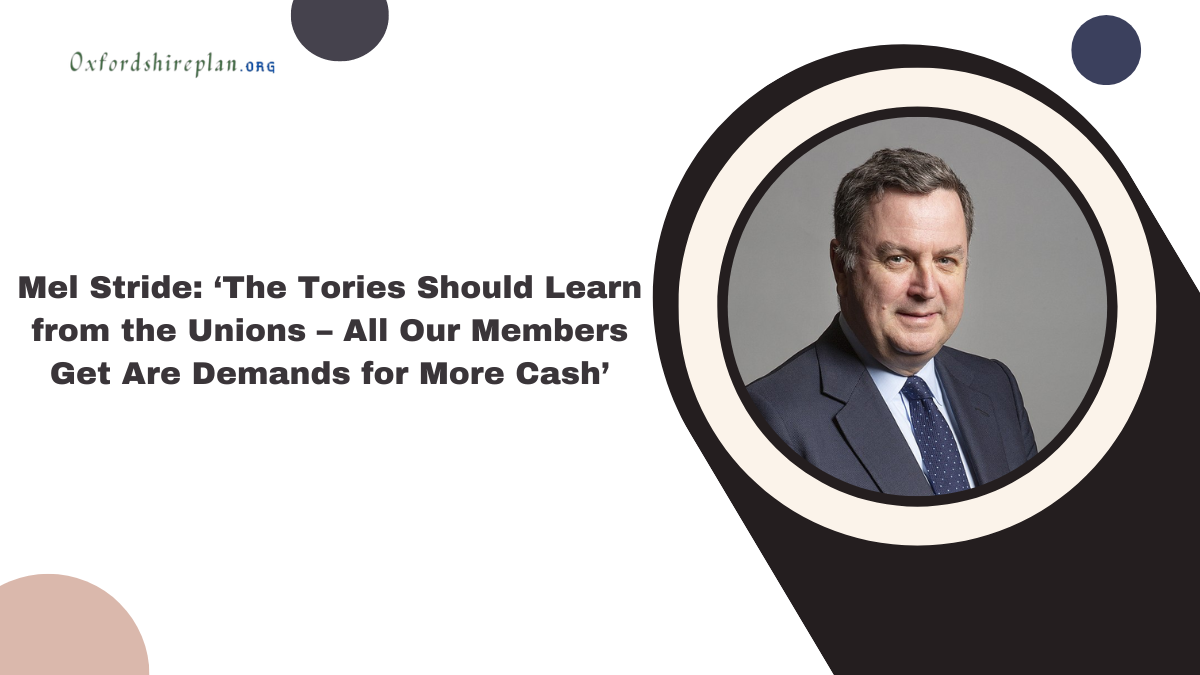Conservative Leadership Candidate on Rebuilding Party Membership and Drawing Inspiration from a War Hero
As a qualified pilot, Mel Stride knows how to handle a life-threatening tailspin in the cockpit. Now, he faces a similar challenge as he competes for leadership of the Conservative Party. Can Stride pull the party out of its steep nosedive, or will he be the first candidate eliminated in next week’s leadership vote?
Here’s a detailed breakdown of Stride’s campaign, his views on the Conservative Party, and his vision for its future.

Contents
- The Leadership Contest: High Stakes for Stride
- Momentum is Key
- The Road to Leadership: Campaign Events and Crucial Votes
- Addressing the Reform Threat: Winning Back Conservative Voters
- The Welfare Reform Plan: Cutting Costs and Getting People Back to Work
- Rebuilding the Conservative Election Machine: Lessons from the Unions
- Digital Transformation for Campaigning
- Real-World Experience: Business and Leadership Skills
- Personal Inspirations: JFK and Field Marshal Slim
- Conclusion: Leadership, Calm Under Pressure, and a Vision for the Future
The Leadership Contest: High Stakes for Stride
Next Wednesday, Conservative MPs will cast their first votes in the party leadership race, eliminating the candidate with the least votes. While the odds are against him—bookmakers put his chances at 40-1—Stride remains optimistic.
- Confident yet cautious: I feel confident, however I’m not taking anything for granted,Stride told me during our interview in Westminster’s Portcullis House.
- Low profile but underestimated: Stride believes that his opponents may be underestimating him. As a former government official, he understands how to count votes and navigate party politics.
The contest remains wide open, with no clear frontrunner among the six candidates. Each candidate, including Stride, needs at least 10 backers to remain in the race. Stride currently has six public endorsements, tying with Tom Tugendhat and placing him ahead of competitors like Priti Patel and James Cleverly.
Momentum is Key
Stride sees momentum as a crucial factor in leadership races. He’s received positive feedback from party members and believes his chances improve with greater exposure. He emphasized that once the final four candidates emerge, there will be more opportunities for debate and media appearances, which play to his strengths.
- Gaining traction: “I’ve now addressed somewhere around 1,000 to 2,000 members, and many tell me, ‘you had a lower profile, but today was a revelation.’”
- Aiming for momentum: He hopes to build momentum through debates, media appearances, and hustings events.
The Road to Leadership: Campaign Events and Crucial Votes
By September 11, two of the six candidates will be eliminated, with the remaining four moving to more intensive hustings events and the Conservative Party Conference at the end of the month. After two more eliminations, party members will choose the final leader by the end of October.
Kemi Badenoch, the current shadow housing secretary, is considered the frontrunner. However, Stride is confident that his lower profile could work to his advantage, just as it did for David Cameron in 2005 when he beat the more experienced David Davis to become party leader.
Addressing the Reform Threat: Winning Back Conservative Voters
Stride is clear on one thing: Nigel Farage and the populist Reform UK party are not the answer to the Conservative Party’s current challenges. Despite losing much of his majority in the 2019 election—winning by just 61 votes—Stride refuses to pander to populism.
- Appeal to voters: Stride believes that the party must respect Reform voters’ concerns on issues like tax and immigration while avoiding populist solutions.
- Policy proposals: He suggests policy initiatives such as exempting first-time workers from their first £5,000 in National Insurance contributions. This money would be diverted into an ISA to help young people save for a home deposit.
Stride is also focused on young voters, a demographic the party has struggled with in recent years. He believes the Tories must reduce the “crossover age” (the age at which voters become more likely to vote Conservative than Labour) from 63 to under 40, as it was in 2019. His proposed policies aim to make low tax Britain more appealing to younger generations.
The Welfare Reform Plan: Cutting Costs and Getting People Back to Work
Stride has a clear view on welfare reform, one that differs sharply from Labour. He’s identified £12 billion in savings that can be made through reforms, especially in areas like Personal Independence Payments (PIPs). Stride believes many people on benefits can and should be helped back into work.
- Critique of Labour: He believes Sir Keir Starmer is making a mistake by avoiding discussions on benefits reform, which could be a major issue in future elections.
- Spending and savings: Stride’s experience as Financial Secretary to the Treasury informs his view that reducing welfare costs and helping people back into work will be crucial for the economy.
Rebuilding the Conservative Election Machine: Lessons from the Unions
Stride is concerned about the Conservative Party’s relationship with its members. He believes the party has neglected its 170,000 members, who currently receive little more than a constant stream of emails asking for donations.
- Learning from unions: Stride argues that the party could learn from trade unions about how to engage with and value its members. He suggests offering exclusive access to events and other incentives to enhance the membership experience.
- Improving communication: Stride also wants local associations to be given more respect, emphasizing that candidates should not be “parachuted in” without local approval.
Digital Transformation for Campaigning
In the long term, Stride envisions digitizing campaign efforts. He believes the Conservative Party should be able to equip its campaigners with iPads to provide voters with real-time information on local issues, enhancing engagement at the grassroots level.
Real-World Experience: Business and Leadership Skills
Stride’s political career started later in life. Before becoming an MP at 48, he built a successful exhibitions and publishing business from scratch. His experience in the business world informs his leadership philosophy.
- Entrepreneurial success: He spent a year in the US setting up a subsidiary, which he later sold. His business, Venture Marketing Group, remains under his control in the UK.
- Championing aspiration: Stride believes the Conservative Party must return to championing aspiration, opportunity, and wealth creation as core values.
Personal Inspirations: JFK and Field Marshal Slim
Stride draws inspiration from John F. Kennedy and Field Marshal William Slim. JFK’s space race speech—”not because they are easy, but because they are hard”—inspired Stride’s entrepreneurial drive. Slim’s leadership during the Burma campaign in World War II serves as a model for Stride’s vision of leadership, particularly his ability to rally a demoralized army.
- Defeat into Victory: Slim’s memoir, which detailed his transformation of a defeated army into a victorious force, resonates deeply with Stride, who believes the Conservatives can similarly turn their fortunes around with the right leadership.
Conclusion: Leadership, Calm Under Pressure, and a Vision for the Future
Stride’s experience as a pilot may not be directly applicable to politics, but his ability to remain calm in a crisis could be just what the Conservative Party needs. As the leadership race heats up, Stride believes that his real-world experience, leadership skills, and policy ideas can help steer the party back to success before the next general election
Click Here to Read More

I am a dedicated lifestyle and fashion enthusiast, always looking for the latest trends and timeless styles. With a flair for creativity and a passion for self-expression, I provide fresh insights and tips on elevating everyday living and personal style.















